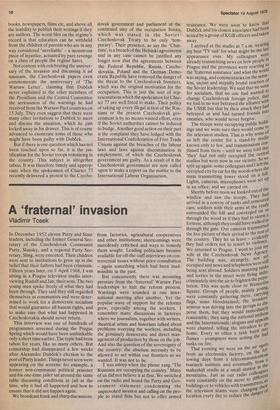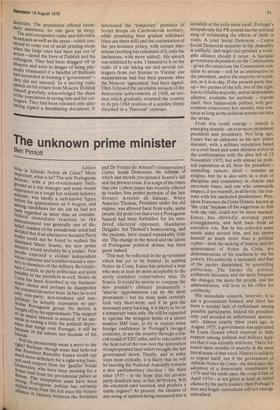A 'fraternal' invasion
Vladimir Tosek
In December 1952 eleven Party and State leaders,, including the former General Secretary of the Czechoslovak Communist Party, Slansky, and a regional Party Secretary, Sling, were executed. Their children were sent to institutions to grow up in the belief that their fathers had been criminals. Fifteen years later, on 9 April 1968, I was sitting in a Prague television studio interviewing Rudolf and Jan, their sons. The two young men spoke freely of what they had been through. They said they still regarded themselves as communists and were determined to work for a democratic socialism that would guarantee all human rights, and to make sure that what had happened in Czechoslovakia should never return.
This interview was one of hundreds of programmes screened during the Prague Spring which would have been unthinkable only a short time earlier. The topic had been taboo for years, like so many others. But censorship had disappeared a few weeks after Alexander Dubeek's election to the post of Party leader. Things never seen were appearing on the screens: for example, a former non-communist political prisoner and his one-time jailer sat around the same table discussing conditions in jail at the time, why it had all happened and how to ensure that it did not happen again.
We broadcast frank and sharp discussions from factories, agricultural cooperatives and other institutions; shortcomings were mercilessly criticised and ways to remedy them sought. Leading politicians became available for off-the-cuff interviews on controversial issues without prior consultation — again something which had been inadmissible in the past.
But concurrently there was mounting pressure from the 'fraternal' Warsaw Pact leaderships to halt the reform process. Warnings were sounded at one international meeting after another. Yet the popular wave of support for the reforms grew, especially among the workers. I remember many discussions in factories where we journalists, together with writers, theatrical artists and historians talked about problems worrying the workers, including the genuinely democratic and direct management of production by those on the job. And also the question of the sovereignty of the country: the absolute necessity to be allowed to act within our frontiers as we wanted. It was not to be.
was asleep when the phone rang. 'The Russians are occupying the country.' Many of us did not believe it at first. We switched on the radio and heard the Party and Government statement condemning the unprovoked invasion and calling on the people to stand firm but not to offer armed
Spectator 19 August 1978 resistance. We were soon to know that Dubeek and his closest associates had been seized by a group of KGB officers and taken away. I arrived at the studio at 7 a.m. wearing my best 'TV suit' for what might be my last appearance ever. My colleagues were already transmitting news on how people in Prague and the provinces were reacting to the 'fraternal assistance' and what the world was saying, and commentaries on the sense" less, unjust and stupidly brutal reaction of the Soviet leadership. We said that we were for socialism, that no one had wanted to change Czechoslovak foreign policy,that we had in no way betrayed the alliance with the USSR but that by their attack they had betrayed us and had turned friends into enemies, who would never forgive.
The troops were occupying public bu irigs and we were sure they would come t° the television studios. That is why some of us left the centre for a stand-by studio known only to few, and transmissions continued from there — until we were told that 'they' had not only occupied the central studios but were now in our vicinity. So we split up again: some colleagues and! left the occupied city by car for the woods where the main transmitting tower stood on a hill. Lights, cameras, microphones were set tiP in an office, and we carried on.
Shortly before noon we looked out of the window and saw thetroops. They hal arrived in a convoy of tanks and armoureo cars; soldiers with their arms at the readY surrounded the hill and converged nil us through the wood as if they had to storm a fortress, although they could have walked in through the gate. Our cameras transmitted, the live picture of their arrival to the rest °I the country. They let us leave — evidentlY they had orders not to resort to violence. We returned to Prague. I went to join my wife at the Czechoslovak News AgeneYi The building was, strangely, not yet occupied and news and telephotos were still being sent abroad. Soldiers manning tanks and lorries in the street were firing indiscriminately into the air to frighten the poPtl" lation. This was quite close to Wenceslas Square. Groups of people, mainly YotT.g„' were constantly gathering there, carrylli. flags, some bloodstained; the invaders armour was driving into the groups to disperse them, but they would immediatemlY reassemble; they sang the national anthe ,s and the Internationale; slogans and appeals were chanted, telling the intruders to go t, home. Every so often a tank burst in _1 flames — youngsters were setting the fire tanks on fire. That evening we were on the air again from an electronics factory, on the following days from a telecommunicatl° a research institute and eventually from ,,e makeshift studio at a small station mountains. Just as our radio colleagu!nt were constantly on the move to differ%) buildings or to vehicles with transmitterszel. the television teams were changing tri of location every day to reduce the danger
detection. The population offered exemplary assistance, no one gave us away.
The anti-occupation radio and television broadcasts as well as the press which continued to come out of small printing shops When the large ones had been put out of action saved the lives of Dub6ek and his colleagues. They had been dragged off to Moscow and were in danger of being physically eliminated if a handful of Stalinists had succeeded in forming a `government'they did not succeed. In a moving radio speech on his return from Moscow Dubtek himself gratefully acknowledged the share of the population in saving him and his colleagues. They had been released only after having signed a humiliating document. It
sanctioned the 'temporary' presence of Soviet troops on Czechoslovak territory, while promising their gradual withdrawl (they are there still) and the continuation of the pre-invasion policy, with certain limitations (nothing has remained of it, only the limitations, with more added). His speech was inhibited by sobs. I listened to it on the radio of a car taking me and several colleagues from our frontier to Vienna: our transmissions had lost their purpose after the Moscow 'agreement' had been signed. Then followed the inevitable erosion of the democratic achievements of 1968, an erosion which gradually returned the country to its pre-1968 position of a satellite firmly clenched in a 'fraternal' embrace.



































 Previous page
Previous page